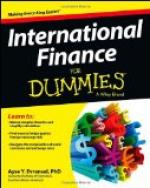For instance, let us suppose that an emissary of the Republic of Barataria approaches a London issuing house and intimates that it wants a loan for 3 millions sterling, to be spent half in increasing the Republic’s navy, and half in covering a deficit in its Budget, and that he, the said emissary, has full power to treat for the loan, and that a commission of 2 per cent. is to be paid to him by the issuing house, which can have the loan at a price that will easily enable it to pay this commission. That is to say, we will suppose that the Republic will take 85 for the price of its bonds, which are to carry 5 per cent. interest, to be secured by a lien on the customs receipts, and to be redeemed in thirty years’ time by a cumulative Sinking Fund working by annual drawings at par, or by purchase in the market if the bonds can be bought below par. If the Republic’s existing 5 per cent. bonds stand, let us say, at 98 in the market, this gives the issuing house a good prospect of being able to sell the new ones easily at 95, and so it has a 10 per cent. margin out of which to pay stamps, underwriting and other expenses, and commission to the intermediary who brought the proposal, and to keep a big profit to themselves. From the point of view of their own immediate interest there is every reason why they should close with the bargain, especially if we assume that the Republic is fairly rich and prosperous, and that there is little fear that its creditors will be left in the lurch by default.
From the point of view of national interest there is also much to be said for concluding the transaction. We may, with very good ground, assume that it would also be intimated to the issuing house that a group of Continental financiers was very willing to take the business up, that it had only been offered to it owing to old standing relations between it and the Republic, and that, if it did not wish to do the business, the loan would readily be raised in Paris or Berlin. By refusing, the London firm would thus prevent all the profit made by the operation from coming to England instead of to a foreign centre. But there is much more behind. For we have seen that finance and trade go hand-in-hand, and that when loan-houses in the City make advances to foreign countries, the hives of industry in the North are likely to be busy. It has not been usual here to make any express stipulation to the effect that the money, or part of it, raised by a loan is to be spent in England, but it is clear that when a nation borrows in England it is thereby predisposed to giving orders to English industry for goods that it proposes to buy. And even if it does not do so, the mere fact that England promises, by making the loan, to hand over so much money, in effect obliges her to sell goods or services valued at that amount as was shown on an earlier page.[6] On the Continent, this stipulation is usual. So that the issuing house would know that, if they make the loan, it is likely that English shipbuilders will get the orders on which part of it is to be spent, and that in any case English industry in one form or another will be drawn on to supply goods or services to somebody; whereas if they refuse the business it is certain that the industrial work involved will be lost to England.




